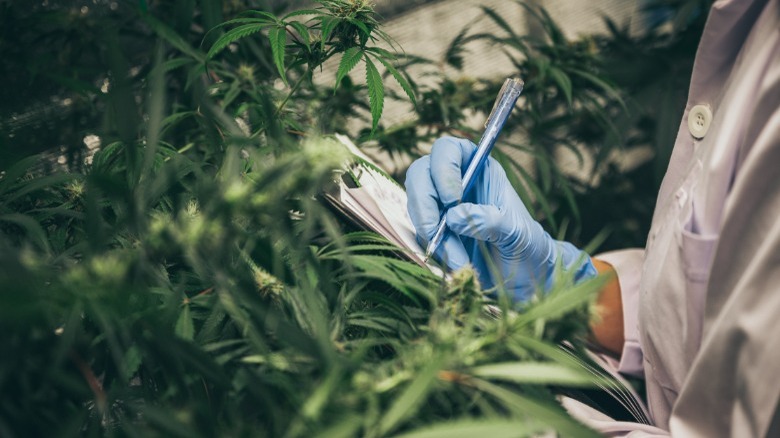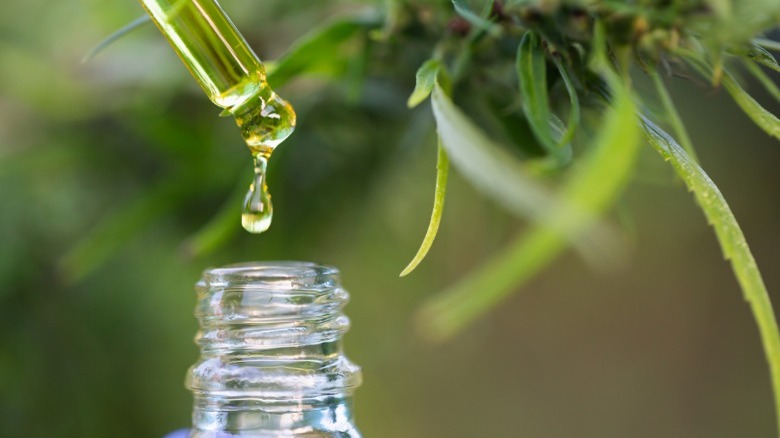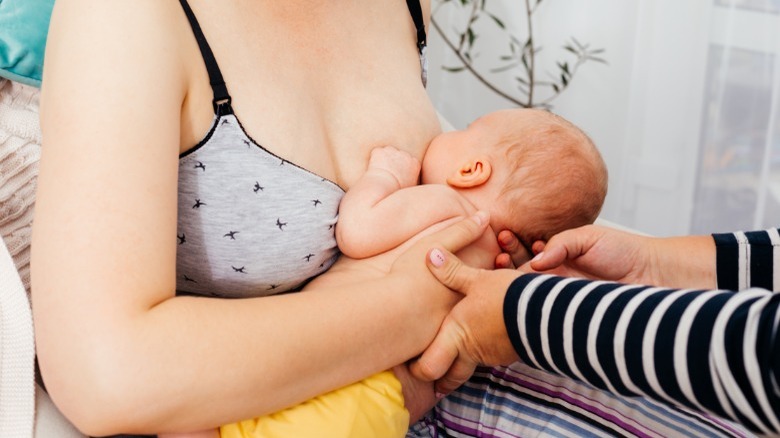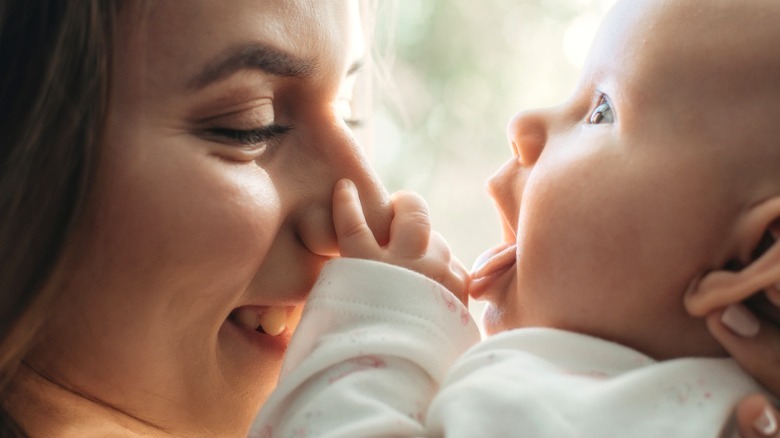Can You Still Take CBD When You're Breastfeeding? Here's What We Know
Over the last decade, the United States has undergone a marijuana revolution, legalizing the substance for recreational use in more than 20 states for the first time in 2012, with Washington and Colorado blazing the new path, so to speak. Since then, marijuana products have proliferated in the mainstream — from chocolates to tinctures — as the culture surrounding its use expands, and casual users play with their preferences. For some, that does not include the psychoactive properties of marijuana, stimulated by the delta-9-tetrahydrocannabinol (THC) compound in the cannabis plant. Instead, another compound has instead received attention for its extensive anecdotal reports of helping ease anxious minds, assisting better sleep, relieving pain, mitigating cravings, and even decreasing seizures in pediatric patients, all without getting high. That compound is CBD.
Now, what demographic of people could benefit from such effects? Though it might not be obvious at first, mothers, specifically breastfeeding mothers, might turn to CBD for most all of the aforementioned reasons. But is using CBD while breastfeeding safe?
Scientifically known as cannabidiol, CBD is "the second most prevalent active ingredient in cannabis (marijuana)," according to Harvard Health, but does not feature the psychoactive properties of THC. There is a lack of research on how CBD can actually benefit or harm breastfeeding mothers and their infants, and the effects of CBD on nursing mothers and their babies still lacks conclusions.
The FDA's rules and regulations
The US Food and Drug Administration (FDA) has many regulations when it comes to cannabis, some of which have previously made researching CBD for its potential benefits difficult. The Drug Enforcement Administration (DEA) made the clinical research process easier in 2015 when it allowed researchers expanding the scope of their trials to more readily obtain the CBD they needed for continued studies. Research is still stunted, however. And although CBD derived from hemp is legal at the federal level — as long as its THC content is under 0.3% — and though regulatory caveats can change state-by-state, at the time of writing, the FDA has not approved any CBD products except one, for pediatric seizures.
The FDA currently advises that pregnant or breastfeeding women do not use marijuana in any form, including CBD, positing that there is "significant cause for concern," citing the potential for CBD products to be infiltrated with cross contamination from pesticides, heavy metals, bacteria and fungi. A 2020 study by the FDA also found that unregulated CBD products are frequently mislabeled, with some misrepresenting the amount of CBD contained in a given product or not accurately disclosing a presence of THC.
Why is this important? Because substances breastfeeding mothers ingest can accumulate in breastmilk, this means it can transfer to their babies during feeding. Although cannabinoids are found naturally in breastmilk, it remains unclear whether CBD or THC could have an adverse effect on the development of the baby.
Studies on CBD and infant health are limited
Most studies on the effects of using cannabis while breastfeeding center around the potential effects of THC and not CBD. While the two compounds are chemically similar, they are not the same, meaning such studies might not tell us much, if anything, about the effects of using exclusively CBD products while breastfeeding. Per the FDA, "There is no comprehensive research studying the effects of CBD on the developing fetus, pregnant mother, or breastfed baby."
One study followed a cohort of eight women who smoked cannabis up to five months postpartum and found a mean of 2.5% of each mother's dose of THC ended up in her breastmilk. Another study determined THC to be present in breastmilk for up to six days after use, meaning that the "pump and dump" method encouraged for breastfeeding mothers who have a serving of alcohol, might not apply to cannabis (via InStyle). However, more research is needed before anyone can definitively say that's the case.
What researches do know, however, is that breastfeeding is incredibly beneficial for the health of infants. Babies who are breastfed have a reduced risk of asthma, type 1 diabetes, Sudden Infant Death Syndrome (SIDS), and certain infections, among others. Breastfeeding mothers also have decreased risks of high blood pressure, type 2 diabetes, and ovarian and breast cancer, per the CDC.
Alternative perspectives
It's worth noting the discussion around CBD use for mothers is about more than just maternal and infant health. The Journal of Cannabis Research provides another perspective on CBD usage rooted in patient autonomy and racial justice, pointing out that discouraging breastfeeding mothers from using CBD or implying that CBD is dangerous could actually cause more harm.
The authors argue that "stigmatization of substance use in pregnancy has been historically linked to punitive approaches with a disproportionate impact on minority populations," further noting that breastfeeding has proven benefits for mother and baby that could outweigh its potential risks. One study cited in the article looked into how healthcare providers treated pregnant women after disclosing their marijuana use and showed that of 90 women, 48% were not offered further information or counseling. And Black women were ten times more probable than their white counterparts to receive "punitive counseling," including involving Child Protective Services. This places these mothers disproportionately at risk for worsening psychological distress.
The article also points out that discouraging or disallowing mothers from breastfeeding their newborns is inconsistent with the guidelines of the CDC, the American College of Obstetricians and Gynecologists, and the American Academy of Pediatrics.
While the article acknowledges that "potential harm" to infants is possible, it also acknowledges the health issues that mothers face postpartum, including nausea, lack of sleep, and anxiety, can be relieved with CBD.
Alternatives to CBD
Between having a brand new baby to take care of and managing their own wellness, breastfeeding mothers face a lot of stressors. Per The American Psychiatric Association, an estimated one in seven women experience peripartum (previously postpartum) depression. And even more new moms develop the "baby blues," a short period of emotional fluctuations after baby is born. Compounded with recovery from the birth and adjustments to life with an infant, mothers will continue to look for relief.
Of course, with much of the studies around CBD and breastmilk being fairly limited (via CDC), it makes sense that many mothers would remain hesitant to use it. Those who are still inclined toward natural products may feel tempted to reach for an herbal alternative, but herbal supplements, including certain teas, are also discouraged for breastfeeding women for many of the same reasons that CBD is. So what's left?
Among other advice you should listen to while pregnant, engaging in activities such as light exercise, eating a nutritious diet, incorporating the appropriate vitamins, and planning ahead your work or daily schedule can help new mothers feel balanced and well. Other research has shown yoga and mindfulness exercises may relieve some symptoms of peripartum depression (via Brieflands). Additionally, certain breathing exercises can help you get to sleep faster when anxious or over-exhausted. But, importantly, ask for your help from close friends, family, community, and experts such as therapists or doctors when you need it. Of course, should you be struggling with baby blues, peripartum depression, or any other health concerns, check in with your doctor about safe treatments for both you and your baby.




